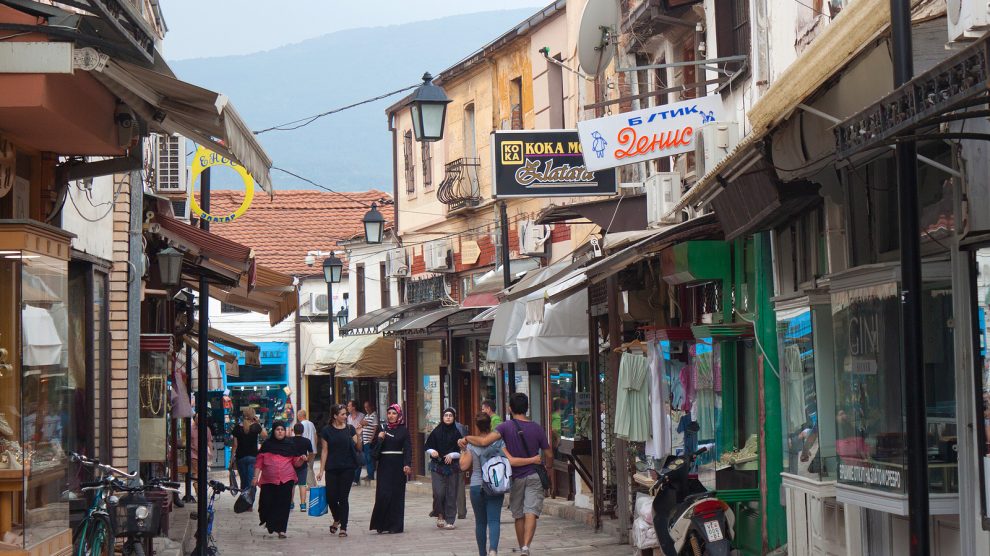Trade could be a strong engine of growth for North Macedonia, by transforming the economy, creating viable jobs, and reducing poverty.
North Macedonia’s economy needs a greater emphasis on trade diversification and openness if it is to create quality jobs, reduce poverty and improve people’s living standards, says a new World Bank report, Trade Policy Strategy 2.0 for North Macedonia.
- North Macedonia – and with it Albania – might finally have overcome key obstacle on EU path
- With all eyes on Ukraine, has the EU given up on the Western Balkans?
- A backpacker’s paradise: Travelling by bus to North Macedonia and Kosovo
Over the past two decades, North Macedonia has made strong strides in reforming its economy and attracting foreign direct investment, which have helped it reach the status of a middle-income country.
Today, however, amid a dynamic 21st century labor market, the structure of the economy remains largely unchanged and trade policy has stagnated. North Macedonia struggles with persistently high levels of unemployment, and around 18 per cent of the population remain in poverty.
The report finds that a lack of trade diversification and a concentration of exports limit the role of trade in North Macedonia’s economy, with growth rates continuously below those of EU and other Western Balkan countries.
North Macedonia’s exports are increasingly oriented toward the EU market and the UK; yet remain limited with regional neighbours in the Western Balkans and other trade partners.
The top 20 export destinations accounted for 89.3 per cent of goods and services exports in 2019 Because of its preferential market access, the EU, Central European Free Trade Agreement (CEFTA), and Turkey remain the main export destinations. Nearly half of total exports go to Germany, with 5.35 billion US dollars accounting for 46.1 per cent.
More focus on services
Although exports to the Western Balkans have increased in absolute terms, their share in total exports remains small. For example, North Macedonia’s trade with its immediate neighbours, such as Albania, is low, at about 54.4 million US dollars. However, exports to Serbia are relatively high, at 610 million US dollars.
“Trade could be a strong engine of growth for North Macedonia, by transforming the economy, creating viable jobs, and reducing poverty,” says Massimiliano Paolucci, World Bank country manager for North Macedonia. “But, for this to happen, the country needs a more open and diversified trade policy, including a greater focus on trade in services, to reap the economic benefits.”
Trade openness in services – which currently account for around 20 per cent of exports – has been weaker than for merchandise, highlighting the untapped potential for trade in services, which will be key in transforming the economy towards that of a high-income country.
A new trade strategy would allow North Macedonia to expand its economic diversification through agriculture, agri-business, services, and more complex manufacturing, which will ultimately lead to greater better paid job creation, business growth and survival, and poverty reduction.
The report argues that trade policy reforms need to be introduced as part of a broader strategy to improve the business climate, attract investment, and raise productivity in the economy. North Macedonia’s ability to achieve greater economic diversification will depend on a wide range of factors, including competition policy, investment policies, innovation, and education policies.
Open Balkans
Skopje does at least appear to be aware of the need to boost trade with neighbouring countries.
Since it was first launched in 2019, North Macedonia has, along with Serbia and Albania, been a key driver of Open Balkans, an initiative intended to facilitate the free movement of people, goods, services and capital in the Western Balkans region.
To date, Kosovo, Montenegro and Bosnia and Herzegovina have refused to join, arguing that the initiative is unnecessary because regional economic cooperation is already part of the EU integration agenda.
Speaking at the United Nations General Assembly last week, North Macedonia’s prime minister, Dimitar Kovačevski, who this summer successfully negotiated a deal with Bulgaria that finally saw Sofia lift its veto on Skopje beginning EU accession talks, reiterated the importance of Open Balkans but also of eventual EU membership.
Unlike many news and information platforms, Emerging Europe is free to read, and always will be. There is no paywall here. We are independent, not affiliated with nor representing any political party or business organisation. We want the very best for emerging Europe, nothing more, nothing less. Your support will help us continue to spread the word about this amazing region.
You can contribute here. Thank you.








Add Comment